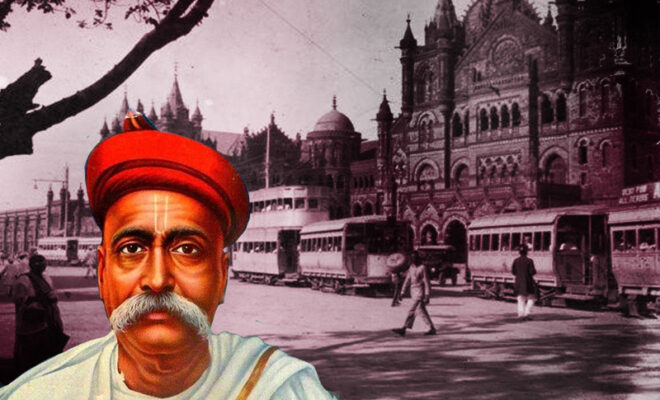Bal Gangadhar Tilak: The Untold Story of Bombay Stopping for 6 Days

Bal Gangadhar Tilak was the Indian editor who took to the streets against the punishment, the army had to be called and Bombay stopped for 6 days.
Late night time Heavy rain Mounted police running in panic spreading panic. Still, thousands of people standing on the road were not ready to tussle. A newspaper editor was about to be punished for writing against the government.
The next morning the public was on the streets. Public anger erupted. And this anger was such that in the midst of heavy violence, Mumbai (then Bombay) was handed over to the army.
Then Mumbai stayed for the next six days. The memory of ‘Kesari’ newspaper and its great editor Lokmanya Tilak may seem strange in the era of loss of trust from news and journalists.
But when the world of news is surrounded by questions, then the forefathers who believe in any cost for the truth must be remembered.
Also Read: Draupadi Murmu Elected As 15th President of India
Tilak’s articles published in ‘Kesari’ on 12 May and 9 June 1908 were termed as sedition. This historic trial took place from 13 to 22 July 1908 in the third criminal session of the Bombay High Court.
Tilak took all possible measures to attain Swaraj. He used his newspaper extensively for public awareness. The courts also became the means of their struggle.
The verdict of this trial was used 14 years later in Ahmedabad in 1922 as a precedent for punishment in a similar case against Mahatma Gandhi.
Tilak’s Nationalist Articles Troubled Britishers
The pioneer of ‘Swaraj is my birthright and I shall have it’, Tilak’s ‘Kesari’ and the nationalist writings published in it enraged the British government. He was first tried for treason in 1897.
Justice Strachey of the Bombay High Court sentenced him to 18 months. But as soon as he came out of jail, he was again on the same path through ‘Kesari’.
Also Read: The Top 7 Most Famous Journalists In India 2022
Davar, who was his lawyer in this case, could not save him from punishment. It is interesting that the same Davar heard Lokmanya’s 1908 trial as a judge and sentenced him.
Britishers Tried To Send Tilak To Jail
In the Surat session of the Congress in 1907, the differences between the moderate and extremist leaders came to the fore.
In the midst of both the factions blaming each other, the British government had intensified the suppression cycle against the extremist leaders.
The government was assuming that Lokmanya Tilak was the source of the anti-British activities going on in the country and he needed to be sent to jail. His much circulated ‘Kesari’ newspaper had become a thorn in the eyes of the British.
Also Read: Top 10 Highest Paid Journalists In India That Every Indian Should Know About
Bombay Governor George Clarke accused some influential people of society of spreading hatred and contempt against the government. When he was speaking, people were guessing where the target was.
Tilak Was Arrested In Bombay
Lokmanya Tilak was arrested in Bombay on the third day of Clarke’s speech on 24 June 1908. A week before this, the case of ‘Kaal’ editor SM Paranjpe was handed over to the session.
Tilak had come to Bombay to help him. After his arrest, the police locked his house and press in Poona. Then during the search the house and the press were ransacked.
The recovery was of a postcard, on which the names of two books on explosives were inscribed.
During the trial, the prosecution had described this postcard as very important as evidence.
When the Bombay government felt that Kesari’s May 12 article would not strengthen the case, the June 9 editorial was also included in the allegations.
Eligible for Lawyer But Became A Teacher
Born on 23 July 1856, Bal Gangadhar Tilak passed his law practice in 1880. Took law classes for nine years. Wrote many scholarly articles on law in ‘Kesari’.
In his public life of 40 years, he was constantly involved in litigation and courts. This also included the courts of London. He faced sedition charges thrice.
The legal skill was such that when he was sent to jail for the first time in the case of treason in 1897, the very next day he prepared a draft of appeal to the Privy Council and handed it over to his lawyers.
This appeal was prepared after hearing the decision in the court. The veteran lawyer was taken by surprise.
Hardly any leader like him has been able to make political use of the judicial process. But it is interesting that he never practiced law as a profession.
All preparations were made to punish Tilak.
In this historic case of sedition, there was complete preparation to punish Tilak. A nine-member special jury was constituted, which included seven Europeans and two Indian Parsis.
Tilak took twenty one hours and ten minutes of six working days between the third and eighth day of the trial to present his defense arguments. Seventy-one Indian and Anglo-Indian newspapers were filed in support of his side.
Tilak said that do not consider it a question of one person, who is undesirable for the government and who is anti-government. Rather consider it as a question of freedom of newspapers in India.
He appealed to the jury to keep in mind the tradition of their forefathers, who fought for freedom of speech and publication of thought.
They consider themselves to be the custodians of newspapers in India. They should stand between the newspapers and the government and work to soften the use of harsh laws.
He also reminded the jury that it was not bound by the judge’s directions with regard to facts.
6 Years’ Exile & 1,000 Fine
The verdict was as expected. He was found guilty by seven European jury members and innocent by two Indians. Judge Davar, accepting the decision of the jury, condemned Tilak in bitter words.
Imprisoned for six years and fined one thousand. The verdict of this case was pronounced at around ten o’clock in the night.
It was the confidence of the people in Tilak’s personality and his written words that even after the rain, thousands of people stood till late night in front of the High Court.
Also Read: Why Is India Called ‘Sone Ki Chidiya’?
Heavy police force was deployed to keep the crowd under control. Mounted police were running everywhere.
Bombay Stopped For 6 Days
The next morning public anger erupted. All the markets were closed. Mill workers went on strike. Bombay stayed for the next six days.
Tilak’s name and slogans echoed everywhere in the streets and alleys. The police had to make a lot of effort to stop the demonstrations.
The agitators also clashed with the government supporters at many places. Then Bombay was handed over to the army. 15 lives lost. All the people got injured.
After the verdict of the trial, Tilak had said from the courtroom, “Even after the decision of the jury, I claim that I am innocent.
There is a supreme power that determines our destiny, and it may be God’s will that the purpose I represent has flourished more in my captive and further torture than in my being free.”
Fifty years later, these words of Tilak were engraved on a marble plaque and placed outside the Central Court of the Bombay High Court.
The punishments given to Tilak in this courtroom were a clear violation of real justice. The purpose of punishing them was to suppress the spirit of freedom and patriotism.
But this purpose was not fulfilled, because the human soul cannot be defeated. No matter how much a man is imprisoned, his indomitable soul cannot be conquered.



